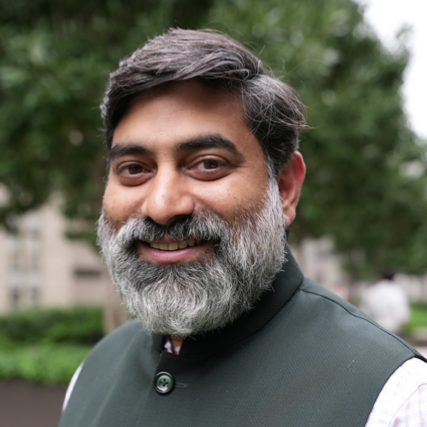Some conversations linger in your mind long after they’ve ended. My recent interaction with two young innovators—Piyush Jha and Harsh Jain—participants in the Hult Prize, did just that. They’re not just dreaming of a better world—they’re actively building it. Their journeys reminded me of the transformative power of active citizenship, and of what becomes possible when passion, personal experience, and purpose come together.
Having spent over two decades working to strengthen India’s social sector, I often meet young changemakers who inspire hope. But Piyush and Harsh stood out. They are not waiting for the “right time” or the perfect ecosystem. They are stepping up now, with the tools they have, from the communities they come from, to tackle deeply personal and profoundly systemic challenges.
Piyush Jha: Turning Waste into Power
Piyush’s journey began in the slums of Mumbai, where waterborne diseases like dengue and malaria were not rare—they were a fact of daily life. Growing up amid poor sanitation and overflowing drains, he didn’t just witness the struggle—he internalised the urgency to change it.
Today, as the founder of Vasudev Innovations, he’s doing exactly that. His team has developed a breakthrough Bio-Electro Chemical Cell (BEC Cell) that treats wastewater while generating electricity. This innovation reduces operational costs by 80% and cuts land use by up to 70% compared to traditional systems.
What’s remarkable is how Piyush has bridged the local and the global. He’s earned fellowships from the New York Academy of Sciences and Mercedes-Benz CSR initiatives, represented India at COP29 in Baku, and secured a $25,000 equity-free grant from Emergent Ventures. Yet, through all this, his heart remains anchored in his community.
“We don’t just want this for Mumbai,” he told me. “Vasudev Kutumb means ‘the world is one family.’ Everyone deserves clean water—no one should get sick because of where they’re born.”
Harsh Jain: Rethinking Breast Cancer Detection
Harsh’s story also starts with personal loss—he lost his grandmother to breast cancer. As a student of biology and electrical engineering at BITS Pilani, he could have chosen a conventional career path. Instead, he chose to innovate at the intersection of empathy and engineering.
During an internship at Indira Gandhi Centre for Atomic Research (IGCAR), he explored thermal imaging and envisioned a better way forward. That vision became Altheros, a startup using thermal imaging and mechanical mapping to detect early-stage breast cancer in a way that is non-invasive, affordable, and portable.
More than a medical device, Harsh’s work fills a critical gap—screening women aged 25–40, who often fall outside the recommended age for mammography, especially in rural areas where access to healthcare is very limited. The device costs a fraction of traditional machines (₹1.5–2 lakh vs. ₹50 lakh–1 crore) and delivers scans at about ₹250 per person (indicatively). Altheros aims to partner with NGOs to run screening camps across Telangana and Andhra Pradesh, bringing preventive care closer to those who need it most.
What Active Citizenship Really Means
In both Piyush and Harsh, I didn’t just see entrepreneurs—I saw citizens in action.
They are solving problems that matter to them personally, and in doing so, they are serving the greater public good. Their stories reaffirm a vital truth: active citizenship isn’t just about casting a vote or policy advocacy. It’s about showing up—for your people, your problems, and your possibilities.
At Dasra, we’ve always believed that true change comes through collaboration—between government, business, civil society, and especially, young people. These two innovators are proof of what’s possible when youth don’t wait for permission to lead.
The Future is in Good Hands
Too often, we wait for systems to fix themselves. But sometimes, real change begins on the margins—from individuals who see the cracks because they’ve lived through them, and who step forward not as critics, but as builders.
This is the kind of youth-led, community-rooted innovation we need more of. And it challenges all of us—not just to admire from a distance, but to participate more actively in our own communities.
To the Piyushes and Harshes of the world: thank you for reminding us that citizenship is not just a status, but a stance—a way of living, acting, and giving back. Your work doesn’t just inspire admiration—it compels action.
So let us all ask ourselves: What’s one thing I can do today to be an active citizen—in my city, my sector, or my street?
Because the future is not only built in labs or at summits. It’s built in conversations, in courage, and in community.

Mr. Deval Sanghavi is the co-founder and partner of Dasra, a strategic philanthropy organisation that has been instrumental in shaping India’s social impact landscape. Over the past 25 years, he has guided Dasra in channelling over USD 420 million to India’s development sector, supporting 1,400 NGOs.
